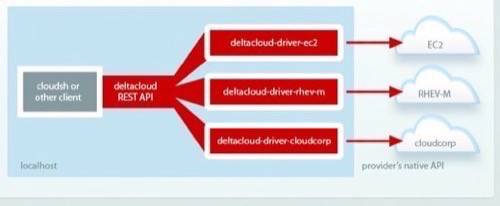Despite Amazon‘s leadership and market share in cloud computing, many in the industry have been reluctant to crown Amazon S3’s API as the standard, arguing it’s too early and too vendor-specific.

And while the former may still be true, the latter could be addressed with yesterday’s announcement by Red Hat that the company is open-sourcing its Deltacloud API. More importantly, perhaps, Red Hat has contributed Deltacloud to the Apache Software Foundation where it is currently an incubator project. This moves the API out of the control of a single vendor and under the supervision of an external governing body.
The Deltacloud core provides a REST API, support for all major cloud service providers (including Amazon, GoGrid, and Rackspace, and backwards compatibility across versions.
The main advantage of Deltacloud is, in the broadest sense, interoperability. Red Hat also lists the following as benefits of the API:
- The API can either be offered directly by the cloud provider, or by individual users running their own server
- Client libraries can easily be written in any number of computer languages, and are already available for popular ones
- The core API logic resides on the API server, enabling consistent behavior across all client libraries
- Support for new clouds can be added to the API without changes to clients
Red Hat has also submitted Deltacloud to the Distributed Management Task Force (DMTF) as a potential industry standard. According to Red Hat’s press release, this move will enable “the portability and interoperability needed to realize the full promise of cloud computing. Open source, under an Apache model, enables a true community-driven solution – unique, and needed, in the cloud computing landscape.”
With all the providers supported, this may be the best representation of what an API standard would look like. But the Deltacloud Initiative is also taking requests for what other features should be included.











